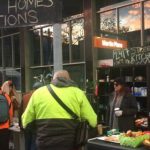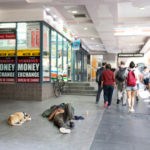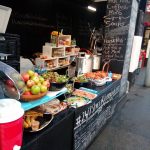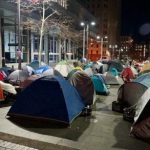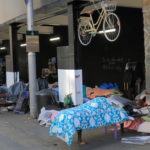Promises Made, Unkept: Lanz Priestley on Martin Place Tent City Three Years On
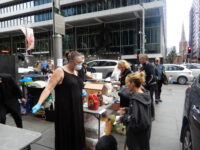
Three years ago, Tuesday, the organisers of the Martin Place Tent City dismantled the setup, which had provided rough sleepers, and those in need in Sydney’s CBD, with free meals and a safe space to sleep between mid-December 2016 until the following August.
As unofficial mayor of Martin Place Lanz Priestley explained back in May 2017, his crew had been operating a Sunday dinner for the homeless in the pedestrian mall, when they’d heard from some of the women sleeping rough that men had been attempting to sexually assault them.
“At that stage, to my mind, you have to do something,” Priestley said. “And we didn’t have time to dot the ‘i’s and cross the ‘t’s. We rolled it out 48 hours later.”
What was established was Sydney’s 24/7 Street Kitchen and Safe Space. It was providing around 400 to 500 free meals a day. And this was despite the fact that the city council and the NSW government made numerous attempts to shut the homeless oasis down.
A place of refuge
As a reminder last week, Lanz posted about the announcement Sydney lord mayor Clover Moore made three years ago, regarding her council and the state government having agreed to establish a 24/7 communal safe space for the city’s homeless if Tent City was disbanded.
The city’s mayor stated at the time that then FACS minister Pru Goward and City of Sydney councillors had agreed to provide funding for a space that would allow rough sleepers to seek refuge.
However, Mr Priestley’s asking what happened to that promised service.
Sydney Criminal Lawyers spoke to Priestley about what the Martin Place Tent City achieved, how the street kitchen setup is continuing to operate to this day, and the broken promises.
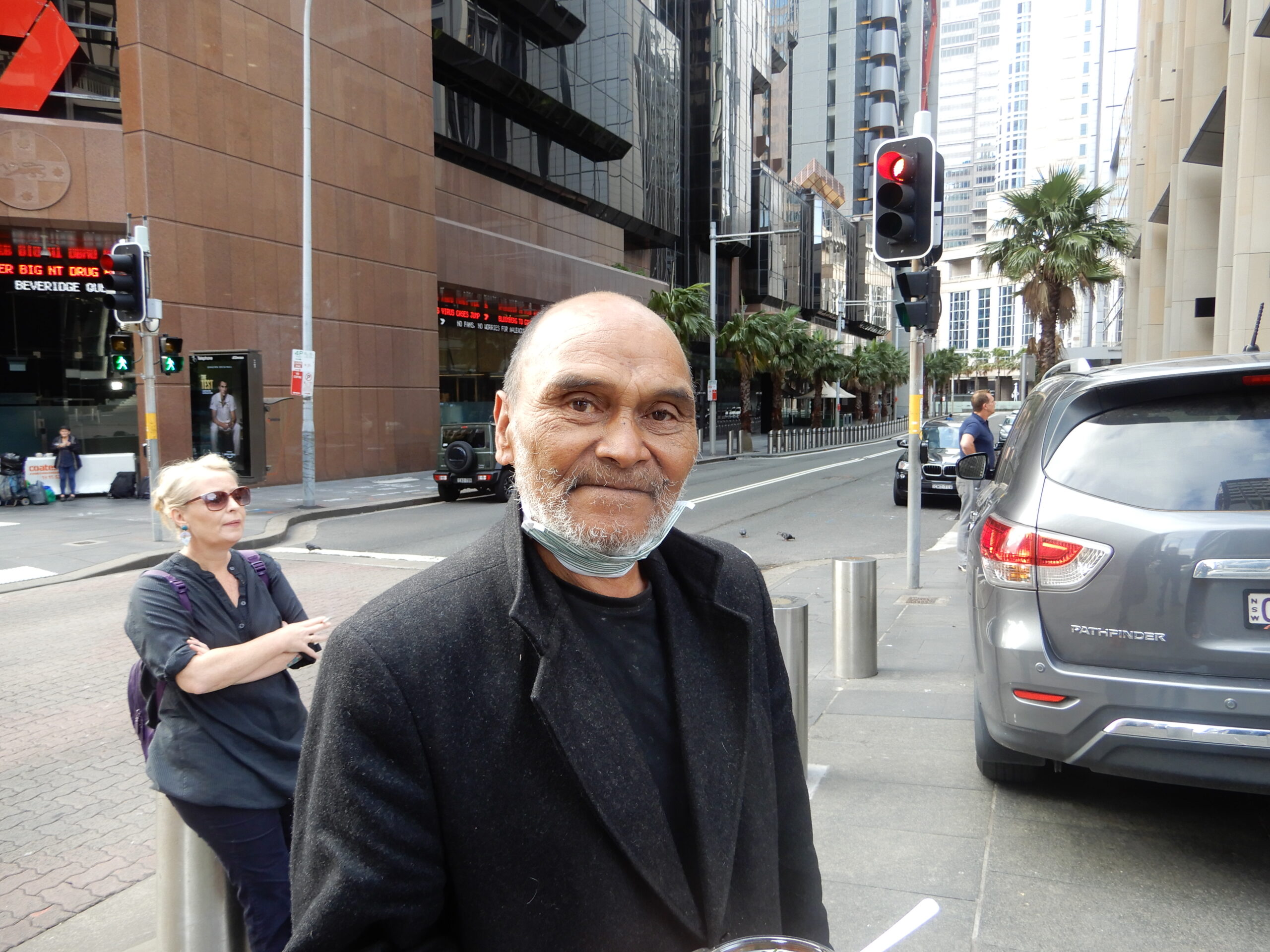
Tuesday, 11 August, marked the third anniversary of the day when you and the other occupants of the Martin Place Tent City cleared the site.
You’d come to an agreement with the City of Sydney, and besides, the Berejiklian government had just rushed through laws, which meant NSW police could be sent in to dismantle the camp.
Looking back at the eight months of the 24/7 Street Kitchen and Safe Space, how do you feel about what you and the other organisers achieved?
From day one, we achieved what we set out to achieve, in terms of the space itself.
That was somewhere safe for women to be protected from predators, whosoever those predators might be – whether they were drunks or whether they were people who wanted to sexually assault them.
That was actually happening. It was the trigger that led to it being put in at Martin Place.
You’ve raised the fact that only days before you vacated the camp, you’d met with Clover Moore and agreed to leave on the proviso that the city would start operating a 24/7 safe space for the homeless.
She announced that the FACS minister had agreed to help financially support the operation of the space. What happened to these promises?
The city made noises about it. Berejiklian made noises about it. I was pretty sure they weren’t going to do anything about it.
I looked at what they were proposing. And with the budgets that they were talking about, they might have been setting this thing up in a phone box.
Even with contributed buildings, I don’t think they could have done it with the money they were talking about.
They were talking about a couple of 100K for a 24 hour operation. And in the way that they would have been obligated to run it, that wouldn’t have been achievable.
Immediately after I spoke to Clover, they went to the press and announced a budget of 200K between them.
I questioned what that could achieve, as, in terms of the way they’re bound to operate, it might have paid two of their staff.
So, three years on, nothing has happened?
Nothing. There’s no safety for any homeless people.
The safety issue was driven home, two weeks after Tent City was pulled down, when one of the guys who had been arrested there, got beaten senseless in Hyde Park by a guy who used a shopping trolley to beat him.
And safety was the main aim?
Safety was the aim on the ground. Of course, the guys asked us to get housing for them. We housed over 200 people ourselves. And by my count, the state government housed 160. So, that was 360.
But, by our count, we also helped just under 500 to transition themselves out of the problem they were in.
We allowed them to tie up their own shoelaces, so to speak. To me, that was the real success of Tent City.
We provided somewhere for people to stay and gave them free decent food for between six weeks and three months. So, it took away that bottom layer of Maslow’s hierarchy of needs.
And we proved that if you leave their money in their pockets, so that they can get themselves out of it, you find a lot of people will actually do that.
The City of Sydney came to that agreement. How do you feel about the fact that they haven’t delivered on it?
Unsurprised – fucking angry – but totally, unsurprised. I don’t think they had any real intention of providing anything for homeless people in Sydney city.
This winter has been an extremely cold one. The virus has been around. There are less people on the street. And because shops have been insisting on card payments, less people have actual cash in their pockets.
What has all this meant?
It has meant that there’s more demand for food. We’ve had to extend the one day we provide free dinners a week to three days now. We’re getting smashed as far as food and resources are going.
As you’ve just mentioned, despite the fact that Tent City came down three years ago, the 24/7 Street Kitchen and Safe Space has continued operating in various capacities.
Can you tell us a bit about what you’ve been up to of late?
Our two main operations are the street kitchen and Blanket Patrol. The street kitchen has been doing food primarily in Martin Place. But, we’ve also got the street kitchen in other places now too.
We’ve got one down in Moruya. There’s one in the Illawarra. We have the Liverpool Street Kitchen. And one started off in Darwin about a year ago.
That’s what the street kitchens are doing. We’re sticking to our crowd-sourced model. We will never become a charity.
With Blanket Patrol this winter, we’ve been supplying sleeping bags as far away as Perth.
And lastly, these are strange times. We’re dealing with the COVID pandemic, and before that, we had the unprecedented bushfire season.
But prior to all this, the problem of homelessness had long been with us.
What would you say it says about a society if it continues to allow a portion of its members to sleep rough?
Society really has to wake up to itself. Not just in terms of homelessness, but in terms of everything that’s problematic.
I’ve said it before, we can’t operate in a way that’s not solution focused. If we’ve got a problem, we need to focus on a zero-problem solution.
And if we’re not doing that, we’re doing something else – normally, that’s making money.


